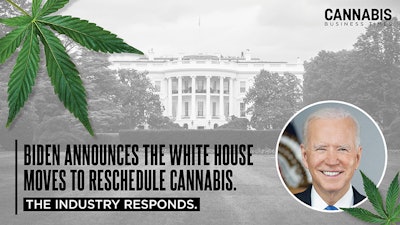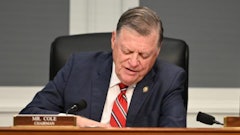
The industry stepped into high gear sharing reactions to President Joe Biden’s May 16 confirmation that the White House is moving forward on the next step to reclassify cannabis, from a Schedule I to a Schedule III drug, under the Controlled Substances Act (CSA).
This announcement came two weeks after the Department of Justice (DOJ) confirmed with Cannabis Business Times that Attorney General Merrick Garland circulated a proposal from the Drug Enforcement Administration (DEA) for the plant’s reclassification to Schedule III. And it came more than a year and a half after Biden directed the Health and Human Services Department (HHS) to conduct an administrative process to review how cannabis is scheduled.
The DEA’s proposal for reclassifying cannabis initiated a review process by the White House Office of Management and Budget.
And coinciding with Biden’s announcement, the DOJ officially announced May 16 that it submitted proposed regulations to reschedule cannabis.
“This is monumental. Today, my administration took a major step to reclassify marijuana from a Schedule I drug to a Schedule III drug,” Biden said in a video message released on social media. “It’s an important move toward reversing longstanding inequities. Today’s announcement builds on the work we’ve already done to pardon a record number of federal offenses for simple possession of marijuana. And it adds to the action we’ve taken to lift barriers to housing, employment, small business loans, and so much more for tens of thousands of Americans.
“Look folks, no one should be in jail merely for using or possessing marijuana. Period,” Biden said. “Far too many lives have been upended because of [our] failed approach to marijuana. And I’m committed to righting those wrongs. You have my word on it.”
Here, Cannabis Business Times compiled reactions from nearly 30 cannabis cultivation and retail companies, industry associations and advocacy and lobbying groups, cannabis attorneys and members of Congress, sent to CBT, and some from published statements and press releases.
David Hart, CEO, The Cannabist Co., formerly Columbia Care, one of the largest, fully integrated operators in the U.S., operating in 16 markets across the country:
“This is a truly momentous and historic occasion for the entire cannabis community. Our federal government has finally formally accepted that cannabis has medicinal value and is following the science that we in this industry have understood and poured our collective passion into while supporting this movement and building our businesses. Once finalized, this change will make state-regulated cannabis more accessible and affordable for our customers and patients. The end of the 280E tax code for cannabis businesses will allow us to operate our business more sustainably and reinvest more deeply into our teams, innovation, and product development to benefit the communities we serve.”
John Mueller, founder and CEO, Greenlight Dispensary, a vertically integrated multistate operator:
“We agree, President Biden – this is a monumental moment, but we still have a long way to go to rectify the injustices of the war on drugs. The recent strides in cannabis rescheduling mark a significant departure from a failed 50-year prohibition policy. We must continue this momentum by calling on our state and federal leaders to prioritize the release of individuals incarcerated for cannabis-related offenses. This is not just about acknowledging the legitimacy of the cannabis industry, but also about rectifying the disproportionate impact of outdated policies on marginalized communities. As we pave the way towards a thriving $50 billion market, let's ensure that justice and equity guide our path forward. It's time to right the wrongs of the past and embrace progress wholeheartedly.”
Bob Groesbeck, Co-CEO, Planet 13, a vertically integrated cannabis company, with cultivation, production and dispensary operations across its locations in California, Nevada, Illinois, and upcoming sites in Florida:
“At Planet 13 we’re very positive any time we see comments out of the federal regulatory environment that are supportive of the industry, but it’s one thing to make press announcements and another thing to follow through. Unfortunately, in our industry we’ve witnessed many announcements with little follow-through, but don’t get me wrong, rescheduling is an important step in the right direction. If the Justice Department, the White House, and the DEA follow through on what they say they are going to do it will be very good for the industry. It’s just a question of when and how these rules come together. We just don’t know that yet. There are many unknowns, and it’s going to take some time for this to develop.
“We need to see meaningful steps forward with safe banking solutions and fair taxation laws to allow cannabis businesses to operate on a level playing field. Until we see tangible progress, we have to remain cautious and guarded in our approach. It’s imperative that the industry be engaged in this process at all levels. Many of us have been in the industry a decade or more, so we know the ins and outs of the business better than most, and it’s important that we have a seat at the table.”
Michael Bronstein, President, American Trade Association for Cannabis and Hemp (ATACH):
“Think about what we are witnessing: Both the U.S. Food and Drug Administration and Drug Enforcement Administration—the most important arms of federal control—are saying cannabis is medicine with the federal government now publishing a rule placing marijuana in Schedule III. This view is what we as advocates have advanced for the last 20 years. It is a statement as bold as it is stunning, given the source. Today the dam of federal prohibition has a meaningful crack.”
Michael DeGiglio, President and CEO, Village Farms International, whose wholly owned Canadian subsidiary, Pure Sunfarms, is one of the largest cannabis operations in the world, according to the company:
“We are encouraged by this continued regulatory progress and are actively evaluating multiple parallel strategies that may enable Village Farms to enter the legal U.S. marijuana market. All options are expected to leverage our unmatched cannabis success in Canada, using our advantage as one of the largest and highest quality greenhouse cannabis operations in the world. We will continue to monitor regulatory and other developments that may result from the proposed rescheduling and look forward to determining the right path forward for the company and our shareholders to fully capitalize on the U.S. marijuana opportunity.”
Caleb Counts, CEO and co-founder, Connected Cannabis, with retail locations in Calif., Ariz., and Fla.:
“While there’s still work to be done, I’m optimistic about what this means in terms of a domino that needed to fall in order for the wave to come that we’ve all been waiting for and working towards for so long. Rescheduling is a step in the right direction without question, and while it isn’t at the stage of descheduling, it’s still impactful for so many people and that doesn’t go unnoticed. Loosening taxes and regulations where customers benefit is always a win in my book."
Lauren Carpenter, CEO and co-founder, Embarc, a cannabis retailer with locations throughout California:
“While this announcement is little more than a confirmation of what was published a few weeks ago, it’s certainly a historic step in recognizing the medicinal benefits and overall positive impact cannabis has on our society. It’s important to remember that there is an entire regulatory and implementation process that can be litigated or unwound by a future administration—which is why voting matters now more than ever. Equally noteworthy and less discussed is pending litigation before the Supreme Court that could retroactively eliminate 280E and could have a faster pathway to implementation. Like all things in government, the devil is in the details. All that being said, I’m happy to see the continued forward momentum at the federal level. It’s encouraging and long overdue.”
Sasha Nutgent, Director of Retail, Housing Works Cannabis Co., a New York cannabis dispensary:
“Currently as a Schedule I drug, cannabis is beholden to the IRS code 280E, through which cannabis businesses are unable to write off traditional business expenses that operators in every other industry can, largely impacting the bottom line of all cannabis-related businesses Rescheduling could provide significant relief in this area for Housing Works Cannabis Co., our CAURD Community initiative partners and the entire legal cannabis industry nationwide, eliminating a detrimental barrier to entry in legal markets. With less worry about being overregulated, rescheduling cannabis allows the legal market to more effectively compete with the illegal market and ensure that American consumers are getting safe, quality products.”
Christopher Louie, co-founder and CEO, Made in Xiaolin, a cannabis company “dedicated to crafting exceptional cannabis products and experiences”:
“For me, it raises more questions than solving any problems that we have. What does this mean from here? Great, marijuana now has medical benefits in the eyes of the government. Does this mean that in order to obtain it you need a prescription and in order to distribute or manufacture it I would need a medical license? It seems this could help out pharmaceutical companies and big businesses affiliated in the medical field, but I’m not sure how this benefits companies like ours.”
Shawn Hauser, partner, Vicente LLP cannabis law firm:
“After more than 50 years, the [DEA] is finally acknowledging that cannabis has significant medical value and ought to be treated as such. Moving cannabis from Schedule I to Schedule III is not the last step—but it is a crucial step—in ending marijuana prohibition once and for all. The accompanying memorandum of opinion from the U.S. Attorney General’s Office is particularly poignant and refreshingly honest. It lifts the veil on the DEA’s longstanding efforts to obstruct progress on cannabis policy reform, and it could have long-term impacts on DEA’s approach to classifying substances.
“... The memo highlights how current federal marijuana policy erroneously equates medical use with FDA approval rather than with its legitimate medical use in treatment, which is being practiced across the U.S. A substance’s medical value should be determined by the medical community, and the medical community has widely acknowledged the medical value of cannabis for decades. Moving cannabis to Schedule III is a more intellectually honest policy that could lend to more marijuana research and the advancement of state medical cannabis programs.”
Paul Armentano, Deputy Director, NORML, cannabis law reform advocacy organization:
“This recommendation validates the experiences of tens of millions of Americans, as well as tens of thousands of physicians, who have long recognized that cannabis possesses legitimate medical utility. But it still falls well short of the changes necessary to bring federal marijuana policy into the 21st century. Specifically, the proposed change fails to harmonize federal marijuana policy with the cannabis laws of most U.S. states, particularly the 24 states that have legalized its use and sale to adults.
“Nevertheless, as a first step forward, this policy change dramatically shifts the political debate surrounding cannabis. Specifically, it delegitimizes many of the tropes historically exploited by opponents of marijuana policy reform. Claims that cannabis poses unique harms to health, or that it’s not useful for treating chronic pain and other ailments, have now been rejected by the very federal agencies that formerly perpetuated them. Going forward, these specious allegations should be absent from any serious conversations surrounding cannabis and how to best regulate its use.”
U.S. Sen. Jeff Merkley, D-Ore., and lead sponsor of the SAFER Banking Act:
“... The Biden administration rescheduling cannabis from Schedule I to Schedule III is welcome news and an important step in the right direction. We cannot let up momentum, though. Cannabis has not been descheduled, so we still have work to do.
“U.S. physician groups, state and national advocates, and broad public opinion all strongly support full legalization. While we continue to push for complete descheduling of cannabis, there are steps we must take in the meantime to protect legal cannabis businesses, users, and community members. Critically, that includes passing my SAFER Banking Act to ensure legal businesses are able to access banking and financial services.
“As we continue to update cannabis policy to reflect the will of the majority of our country, it is imperative that we also address the harms perpetuated by the War on Drugs and the criminalization of cannabis on communities of color. Without descheduling, criminal penalties will continue to unfairly upend the lives of some Americans while others—mainly wealthy, white Americans—escape legal consequences. Anything less than complete federal legalization will result in enduring harms shouldered by our most vulnerable populations.”
Saphira Galoob, Executive Director, National Cannabis Roundtable, an alliance of cannabis companies seeking cannabis reform:
“With the submission of the proposed rule today, the formal administrative process to remove cannabis from the strictest of classifications—where it never belonged—we are moving closer to seeing the most monumental cannabis reform in half a century come to fruition. Just as today’s news is another step forward in the ongoing administrative process that began with the October 2022 directive by President Biden, rescheduling is also a step towards larger federal cannabis reforms. This is an acknowledgment by the multiple federal agencies of what the 38 states with medical programs, 30,000 medical practitioners recommending cannabis, and six million medical cannabis patients have long known: cannabis has medical value. But our work does not end here. While we continue to commend President Biden, the DOJ, and HHS for following the science and not ignoring the need for federal cannabis policies to shift after decades of state leadership, Congress must also take action to further this progress. It starts with addressing the harms of the failed war on drugs, supporting the work that has been done in the states, and providing regulated cannabis businesses with the same resources and opportunities to succeed as all other industries and it culminates with the end of federal prohibition.”
U.S. Sen. Ron Wyden, D-Ore.:
“It’s official, the Biden administration has taken a historic step toward ending reefer madness and bringing commonsense to federal cannabis policy. Now it’s time to follow the lead of 24 states and more than half the country by decriminalizing and putting in place smart federal regulations. Leader [Chuck] Schumer, Senator [Cory] Booker and I have the bill to do it.”
Jim Cole, National Cannabis Roundtable Advisory Board Member and former U.S. Deputy Attorney General:
“The announcement by the Biden administration is one of tremendous importance and substance and should be applauded. The DEA recommendation of Schedule III is an important first step—it’s truly historic and its importance cannot be understated—but it does not solve all of the issues presented by the current approach to the regulation of cannabis in this country. What is really needed is for Congress to act to create a unified regulatory environment that involves both the states and the federal government. By recognizing, as the federal government has done, that cannabis does have valuable medical applications and with the overwhelming legalization in the states, Congress must face the simple reality that cannabis is and will be present in our society and do its duty by providing for the safest and most effective regulatory environment to exist.”
Cynthia W. Roseberry, Director of Policy and Government Affairs, American Civil Liberty Union’s (ACLU) Justice Division:
“President Biden’s decision to reschedule marijuana is the most significant step any American president has taken to address the harms of the war on marijuana. This was a hard-fought win that could not have happened without the tireless advocacy of a decades-long movement for justice. While it is an incredibly encouraging step in the right direction, the rescheduling does not end criminal penalties for marijuana or help the people currently serving sentences for marijuana offenses. It is time for the federal government to further reduce prosecution of marijuana and instead put more resources towards investments that help communities thrive.
“State and local officials should follow this move by the president to scale back and reduce the harms of the war on marijuana in their state and move to decriminalize marijuana. Americans want policies that repair the communities torn apart through overcriminalization and over-policing. Restorative policies include those that prioritize commercial marijuana licenses for formerly incarcerated people, grant clemency to those convicted under unjust drug laws, and expunge criminal records so people have a fair shot at redemption.”
Kassandra Frederique, Executive Director, Drug Policy Alliance a national drug policy advocacy organization:
“When it comes to marijuana rescheduling, President Biden’s words are failing to match his administration’s actions. In a new video, he asserts that no one should be in jail for marijuana, and yet his support for the proposal to reschedule marijuana from Schedule I to Schedule III will continue the federal criminalization of marijuana. His comments reveal a fundamental misunderstanding of how marijuana rescheduling will impact our communities. Rescheduling marijuana to Schedule III would result in tax benefits for marijuana businesses and pharmaceutical corporations but would otherwise maintain the failed status quo. Under Schedule III, federal criminalization would remain in place, meaning arrests, deportations, and family separations for marijuana would continue. Federal food, housing, and education benefits would continue to be withheld from people with a marijuana record. People would remain behind bars for marijuana. And Schedule III would continue the glaring disconnect between state legal regulation programs and federal law.
“Rescheduling marijuana, as President Biden claimed, will not reverse longstanding inequalities nor will it release anyone from prison. As a Black woman who grew up seeing my communities locked up for marijuana and locked out of opportunities to live full lives because of their arrests, I know better than to accept rhetoric in place of action. President Biden promised to decriminalize marijuana and is now offering more of the same. Our communities have waited long enough for commonsense marijuana laws grounded in health, racial equity, and reinvestment. We cannot wait any longer.”
U.S. Rep Steve Cohen, D-Tenn.:
“Since 1976, when I was the Memphis Police Legal Adviser, to my time in the Tennessee State Senate from 1982 to 2006 and throughout my entire service in Congress, I have been an unreserved supporter of liberalizing our cannabis laws. It’s about time.”
George Archos, founder and CEO, Verano, a vertically integrated multistate operator:
“Today’s news from President Biden and the White House approving rescheduling cannabis is another significant acknowledgement from the highest levels of the federal government of the countless economic, social and societal benefits cannabis provides millions of Americans every day. We are grateful that our leaders are finally recognizing the positive power of this incredible plant and listening to the overwhelming majority of Americans who support legalization, and look forward to further progress towards what we hope will be the most monumental year for cannabis reform in the history of our nation.”
Rep. Earl Blumenauer, D-Ore., founder and co-chair, Congressional Cannabis Caucus:
“We are one step closer to ending the failed war on drugs. Marijuana was scheduled more than 50 years ago based on stigma, not science. The American people have made clear in state after state that cannabis legalization is inevitable. The Biden-Harris administration is listening.”
David Goubert, President & CEO, Ayr Wellness, a vertically integrated mutistate operator:
“AYR applauds today’s announcement regarding continued progress on the historic decision to reclassify cannabis from Schedule I to Schedule III. This milestone represents another crucial step towards implementation.”
Bryan Murray, Executive Vice President of Government Relations, Acreage Holdings, a Canada-based, vertically integrated multistate operator:
“Rescheduling cannabis demonstrates that the federal government recognizes its medical benefits. Moreover, it communicates that this administration is serious about correcting its unjust classification as a Schedule I substance. As HHS has shown, the DEA’s decision is supported by extensive research. As a cannabis operator, Acreage recognizes a key benefit of rescheduling is the removal of Section 280E of the Internal Revenue Code, which has unfairly taxed cannabis businesses. Without 280E, we’ll see industry growth, job creation, and greater investment in research and development. Additionally, this decision supports efforts to address past injustices, particularly the disproportionate impact of cannabis prohibition on Black, Brown and economically disadvantaged communities.”
Aaron Smith, CEO and co-founder, National Cannabis Industry Association, an industry advocacy and lobbying organization:
“On behalf of thousands of legal businesses operating across the country, we commend President Biden for taking this important first step toward a more rational marijuana policy. Now it’s time for Congress to enact legislation that would protect our industry, uphold public safety, and advance the will of the voters who overwhelmingly support making cannabis legal for adults. Rescheduling alone does not fix our nation’s state and federal cannabis policy conflict. Only Congress can enact the legislation needed to fully respect the states and advance the will of the vast majority of voters who support legal cannabis.”
Brady Cobb, founder and CEO, Sunburn Cannabis, a medical dispensary operator with locations throughout Florida:
“While the AP story a few weeks ago on the U.S. government’s intent to reschedule cannabis to Schedule III was an amazing step forward, President Biden formally acknowledging the Justice Department’s action to follow through on rescheduling and commence the rulemaking process is the biggest victory in the cannabis reform movement to date. For me, it is a surreal moment and vindication for my late father and so many others. Our work is not done, but today everyone who cares about the cannabis plant should breathe a sigh of relief. Onward.”
Omar Delgado, Vice President of Retail, Ivy Hall, a cannabis retailer with locations throughout Illinois:
“The reclassification of cannabis to Schedule III from its unjust Schedule I marks a historic day for our industry. For years, the cannabis industry has faced undue scrutiny and legal hurdles due to its classification which has perpetuated harmful stereotypes and disproportionately impacted marginalized communities, particularly communities of color. The removal of cannabis from Schedule I is not just a victory for the cannabis industry; it is a victory for justice, freedom and human rights. At Ivy Hall, we are proud to be part of this historic moment, and we remain dedicated to creating a future where cannabis is celebrated, not criminalized.”
Brian Vicente, founder and lawyer, Vicente LLP cannabis law firm:
“President Biden characterized rescheduling as a means of reversing longstanding inequities. One dominating inequity cannabis businesses face is the inability to deduct regular business expenses, since they sell a Schedule I substance. We work with hundreds of licensed cannabis businesses, and the ability to deduct ordinary operating costs under the Schedule III proposal would be a game-changer for them. This proposal will release cannabis businesses from the crippling tax burden they are currently shackled with and allow these businesses to grow and prosper.”
Wendy Bronfein, co-founder, Chief Brand Officer, Director of Public Policy, Curio Wellness, a vertically integrated cannabis operation with retail locations in Maryland and Missouri:
“This is a huge step in the right direction. For the first time since 1970, the government finally recognized the medical validity of the cannabis plant—something our patients and consumers have known for a long time. With today’s announcement, we are one step closer to achieving the ultimate goal of descheduling and societal acceptance. However, our work must not stop here. The industry, patients, and consumers should continue advocating for the descheduling of cannabis. The only way to eliminate stigma and legitimize the legal cannabis industry is to fully remove cannabis from the Controlled Substances Act.”
Jason Vedadi, CEO, Story Cannabis Co., a privately owned multi-state operators with several locations across Ohio, Arizona, and Maryland:“This is a necessary step forward for our industry, and I applaud the Biden-Harris administration for leading the historic push. We can expect to see more private equity, improved taxes and deductions, and increased stock market confidence as a result of this huge step. With the recent news, I am optimistic about our industry’s future.”


























